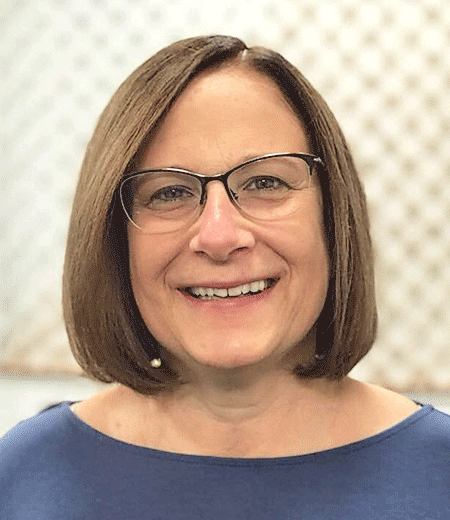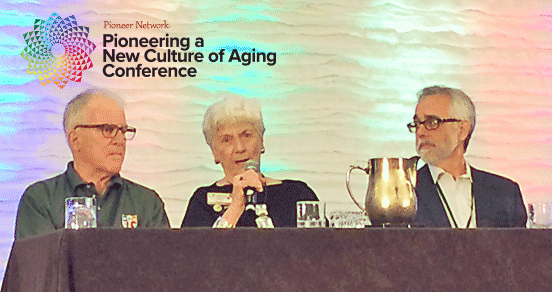 Cathy Lieblich
Cathy Lieblich
Director of Network Relations
At the 2018 Pioneering a New Culture of Aging Conference, we “continued the conversation” that began last year where we asked participants about what it takes to move the concept of culture change forward. KaraLe Causey, Pioneer Network Board Chair, and Megan Hannan, Lead Consultant, Action Pact, facilitated this year’s session that included a panel of Elders, one who is living with Alzheimer’s Disease and the other who is living with Parkinson’s Disease. One member of the panel lives in the independent living part of a continuing care retirement/life plan community (CCRC). Another panelist lives in an assisted living community and the third lives in his own home with some paid help. Highlights this year included their personal experiences with aging and living with dementia in addition to their views on ageism and how to change the culture of aging.
Here’s what they had to say:
- Living with dementia is often not readily apparent so experiences included the person not being believed when they say they have Alzheimer’s Disease, Parkinson’s Disease, Lewy Body or other causes of dementia. One panelist was sitting in a seat on a bus designated as being for older adults or people with disabilities and was yelled at by a woman for doing so. Then when he told her that he was living with Parkinson’s Disease, the woman didn’t believe him. The good news is that he used it as a “teachable moment.” Another panelist stutters when he gets nervous and was mistaken as drunk at an airport and then not believed when he said he is living with Alzheimer’s Disease and was not drunk.
- The panelist who lives in a CCRC described how their community encourages a lot of interaction between residents living with dementia with those that are not which has helped them develop meaningful relationships and treat each person as a unique individual.
- What people want is “to be seen” for who they are, their needs and preferences.
- TV shows need to stop depicting older people in a negative way. An example given was an episode of Saturday Night Live in which older people were learning how to use Alexa, a new technology, and they were not able to get it which led to laughter. One panelist said, “Laughter helps your spirit, but not if you’re being made fun of.”
- People don’t know what ageism is or how to identify it when they see it. One way to start making people more aware of how pervasive ageism is in our society is to tell their family and friends to look at birthday cards and the negative comments about getting older. And also to notice how the age of a woman is included in newspaper articles which is not true of men.
- People who have a particular issue (e.g., cognitive issues, needing to use a walker) are more likely to listen to how things need to change.

Continuing the Conversation Panelists
Here are ideas that were generated from a conversation between the panelists and the audience:
- The first step to change is awareness and a good place to start is with your own family and friends.
- Need to invite the media to the Pioneer Network conference and try to get as much media coverage as possible about the need for change and the fact that there are many providers on their culture change journey who are willing to share what they are doing with their peers and the public.
- Need to figure out how to reach the masses. Ideas included finding a celebrity willing to be the spokesperson for changing the culture of aging, care and support; letters to the editor; public service announcements; and documentaries.
- Need a revolution! People need to get angry about how aging is portrayed and take to the streets.
Those were some of their thoughts and ideas and now we’d like to hear yours. Please let us know your ideas for changing the perception of aging and the culture of care and support through our blog or on our social media pages.



It is so meaningful to hear the wise words of Elders. Now we need to take those words and spread the message that we need change – to find ways to respond to this call for action. Yes, it will take a revolution, but it also takes small steps – one person, one day at a time! It takes connections generated by relationships – if you have a connection that could help drive this movement, won’t you make an introduction to Pioneer Network? As we know, it’s all about relationships!
I have two comments/suggestions about moving the mission forward, which includes most certainly activism against ageism.
1. I strongly endorse a media presence at the Pioneer Network Conference. I know that Joan does so, so much work and puts in so many hard and efficacious hours in conference planning. Perhaps member of the conference state/city culture change coalition already have connections with the print and broadcast media and can be of assistance in that regard.
2. Would professionals serving in our field respond to urging from the Pioneer Network to invite themselves as a guest speaker just once each semester to classes where future health care providers are: nursing schools, universities that have programs in health care administration and/or gerontology.
Thank you, Sister Imelda. Great idea, too, about professionals being guest speakers for classes where future health and long-term care providers are being taught. We need to educate them as early as possible in their professional education.